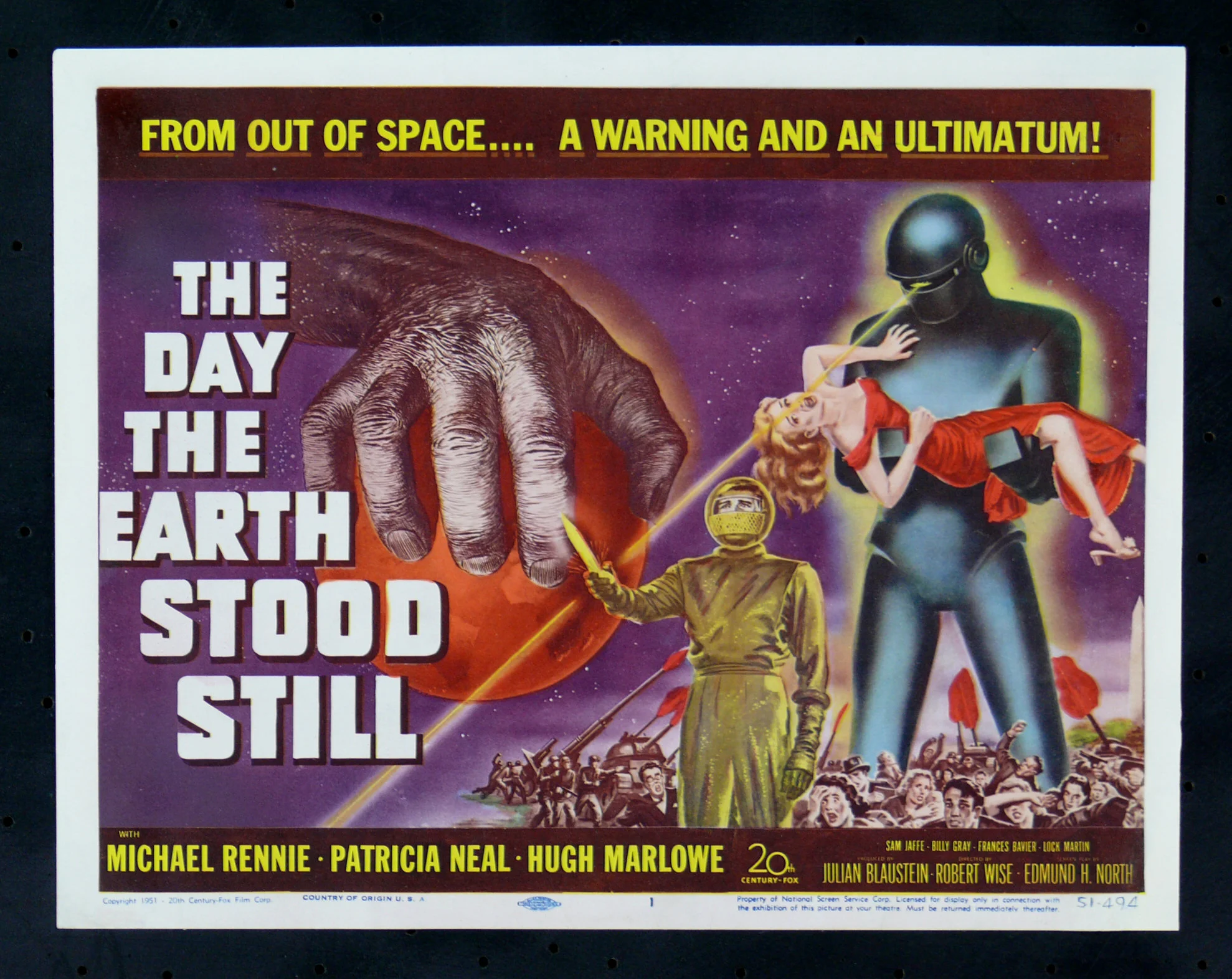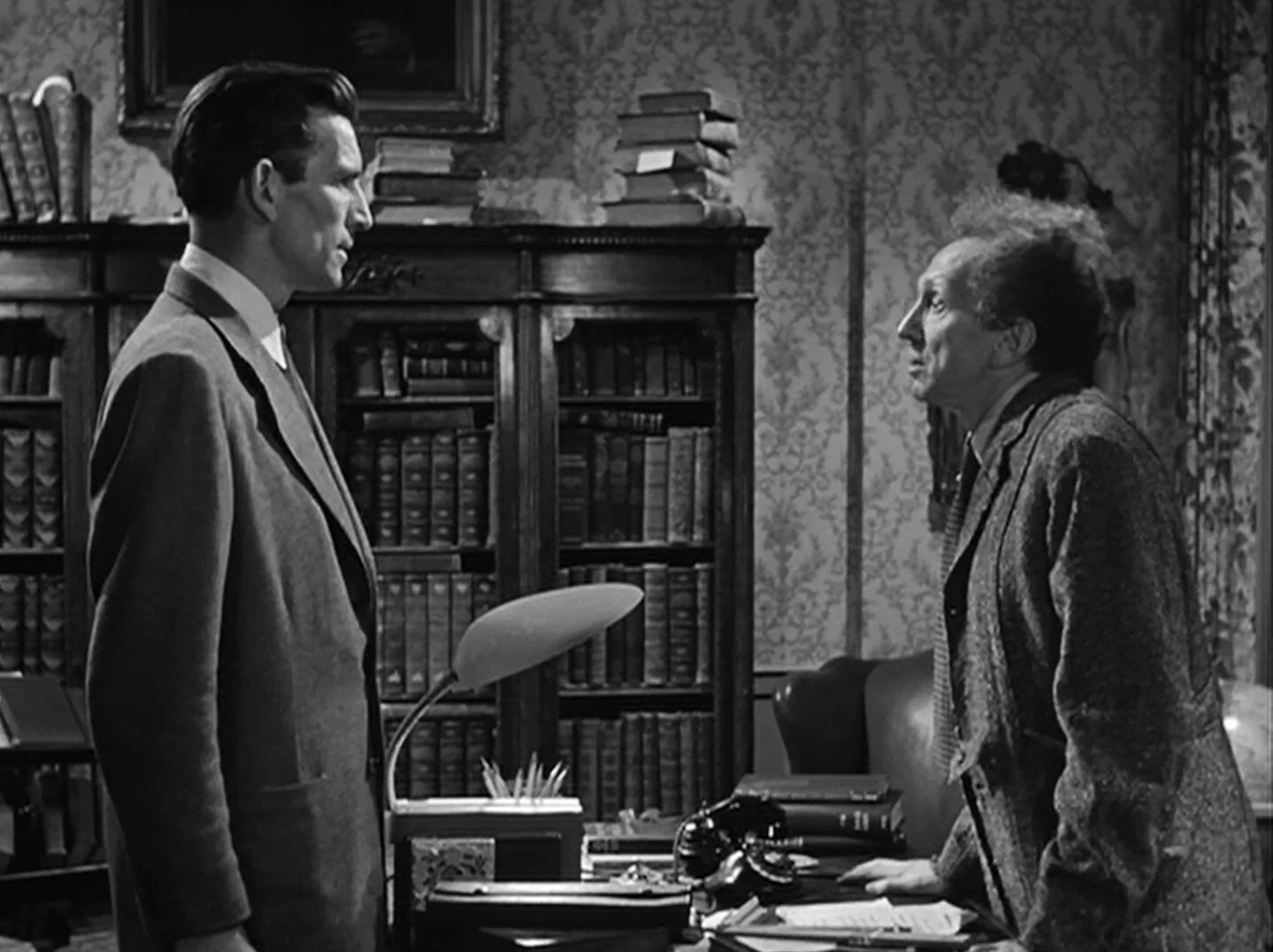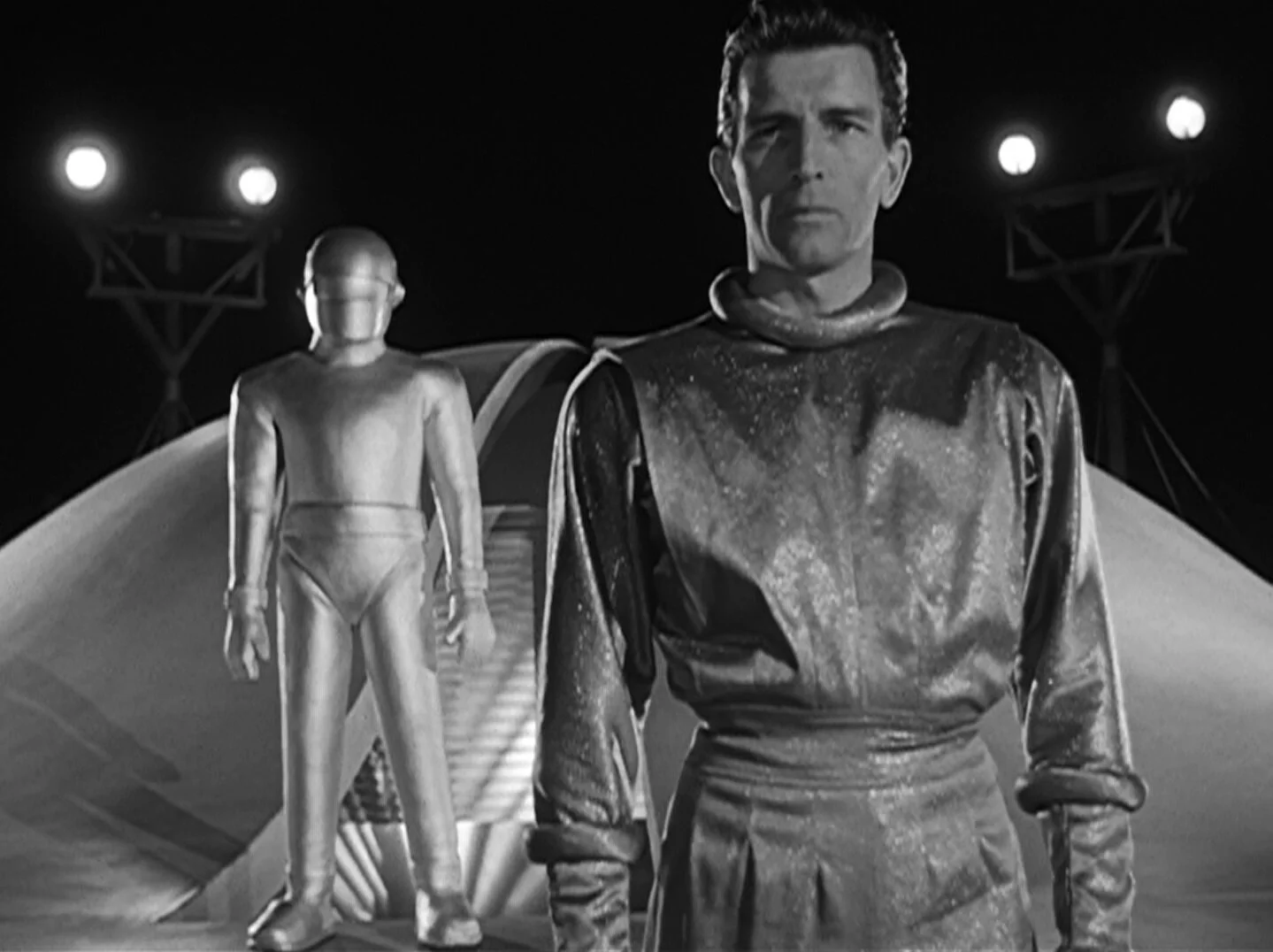THE DAY THE EARTH STOOD STILL (1951)
lobby card from 1951
Klaatu & Barnhardt
Easily one of my absolute favorite films of all time— This thing resonates me for days after it ends. It tells the story of Klaatu, a humanoid who comes to Earth with his robot, Gort. Klaatu’s portrayal as a humanoid instead of a traditional looking Alien is what focuses your attention on the moral of the plot, as opposed to the visual entertainment factor of a traditional Sci-Fi film— though the special effects, for 1951, really aren’t as goofy as one would think.
Klaatu lands his flying saucer in Washington DC— awaiting movement from the ship, the US Army is deployed to surround it in the event the foreign object poses a threat. After a few hours, Klaatu emerges stating that he comes “in peace and with good will”. Reaching into his breast while approaching the surrounding Army, Klaatu pulls out a device which looks like one of those hair scratcher things you’d find at Brookstone (a religious experience if you’ve never felt one on your head) Some goofy GI ends up shooting Klaatu in the shoulder as he drops to the ground. It’s after this takes place that Gort, the traveling robot companion of Klaatu, emerges from the ship & disintegrates the Army’s weapons with a laser beam from his eyes. The crowd screams & the army begins to move back, perceiving Gort as a threat. Klaatu gives him an order to desist and he stands down. Klaatu is approached by a group of GI’s as he tells them what he had a was a gift to their President, a tool he could have used to study life on the other planets— good going, America. They bring Klaatu to Walter Reed Hospital where doctors become puzzled at his overwhelmingly fast recovery from some type of balm that came from his home planet.
Klaatu’s hospital room becomes a revolving door for visits from doctors, army generals, and representatives from the White House— he requests a meeting with all the leaders of the world’s nations, explaining he has a message for them that must be delivered simultaneously. Mr. Harley, the secretary for the president, argues that the current geopolitical climate would restrict such a meeting. Klaatu then suggests he explore the everyday world to better understand the “unreasoning suspicions and attitudes” of the human race. After this suggestion is rejected by Harley, Klaatu sneaks out of his hospital room and integrates himself with the people of DC. Adopting the alias ‘Carpenter’ off a dry cleaning tag from the suit he obtained, he rents a room in a boarding house where he befriends young widow Helen Benson & her son Bobby. Bobby will become an integral part of Klaatu’s exploration of Earth’s people. Taking advantage of the boy’s naiveness of the news headlines that read “MISSING SPACEMAN!”, Klaatu looks to Bobby’s youthful insight of the world around them.
As Helen Benson is ready to go out with her boyfriend, Tom Stevens, she regretfully realizes she didn’t have a babysitter for Bobby and insists he comes with them— Klaatu appears in the boarding house and suggests he can watch Bobby. Initially, Helen is skeptical to let him watch her son, but Tom Stevens insists that it is totally cool— though Klaatu is truly no threat at all, this paints the picture of how much of a jackass Tom Stevens is. Hate that guy.
Bobby & Klaatu
Bobby takes Klaatu on a tour of the city, visiting Arlington National Cemetery & the Lincoln Memorial— it’s here we find out that Bobby’s father died in WWII. As could be predicted, Klaatu learns that most of these deceased men buried there are American soldiers who died in War, foreshadowing the deeper reasoning behind his visit to Earth. Klaatu eventually asks Bobby the question of “Who is the smartest man?” to which Bobby replies “Professor Barnhardt”.
Barnhardt is very much an Albert Einstein looking mathematician fella who also happens to reside in DC. They go to the professors home and find out that he is out. The two enter Barnhardt’s office when Klaatu picks up a piece of chalk and finishes an equation on his chalkboard. The housekeeper finds them & tells them they need to leave— Klaatu insists he leave his contact information for the Professor to reach him, all while not disclosing his true identity to the housekeeper.
Gort & Klaatu
In the evening, Klaatu meets Barnhardt and explains the reason for his visit. The Earth may be in grave danger if it continues the destructive path that it’s on. The people of other planets are concerned over the development of rockets & the weaponizing of atomic power. Klaatu explains that if the message if ignored, the Earth will be “Eliminated”— whatever that means. Barnhardt agrees to gather scientists from around the world to meet in DC, suggesting that Klaatu perform a harmless demonstration of his power. Klaatu stops back at the boarding house to obtain a flashlight from Bobby— he then heads back to the spaceship, unaware that Bobby has followed him. To gain access to the ship without raising alarm, Klaatu orders Gort to knock the two Army guards unconscious. He does something in the ship, but we’re not really sure what it is— likely preparation for his demonstration. Some classic alien shenanigans.
Apologies if I’m just giving you a synopsis of the film— you can bail out at any point. If I haven’t spoiled the film by now, I will in the next few paragraphs.
Bobby runs back home where he stays up waiting for his mother & Tom to get home. When they arrive, Bobby explains to them what he saw— his mother insists he was having a nightmare and he insists he wasn’t. Tom runs upstairs to knock on Klaatu’s door. When there is no answer, he lets himself in— this guy is seriously the most irritating character. He finds Klaatu’s diamonds and brings them to a jeweler friend. The jeweler insists that diamonds like those are not from this planet— further confirming the suspicion surrounding Klaatu. Simultaneously, Klaatu finds Helen at her workplace and steps into an elevator with her— as they’re in the elevator, the clock strikes noon and it is immediately stopped. The lights go out and the elevator is stuck— Klaatu explains that he has temporarily neutralized the electricity around the globe with the exception of hospitals and airplanes in flight. Helen realizes who he truly is before he is able to reveal his true identity.
Helen and Klaatu decide to visit Barnhardt together, but some dumb kid gave away their location which results in a pursuit of their taxi. Worried that he will be shot, and unsure of Gort’s reaction, Klaatu explains to Helen that she needs to find Gort and yell out the command “Klaatu barada nikto” — sure enough, Klaatu is shot & Helen races to the saucer before Gort causes serious damage. Gort carries Helen inside the saucer then leave to find Klaatu’s body— Klaatu is revived and he explains to Helen that his resurrection is only temporary.
The film ends with Klaatu addressing the gathered scientists— the dialogue is straight out of a true Liberty manifesto— I think this film really shaped my personal ideology which is why I have such a fond appreciation for it. The message of non-aggression is something that always spoke to me, even in my younger days. We can only pursue truth, so long as we have achieved peace.
“I am leaving soon, and you will forgive me if I speak bluntly. The universe grows smaller everyday, and the threat of aggression by any group, anywhere, can no longer be tolerated. There must be security for all or no-one is secure. Now this does not mean giving up any freedom, except the freedom to act irresponsibly. Your ancestors knew this, when they made laws to govern themselves, and hired policemen to enforce them. We of the other planets have long accepted this principle. We have an organization for the mutual protection of all planets and for the complete elimination of aggression. The test of any such higher authority is of course the police force that supports it. For our policemen, we created a race of robots. Their function is to patrol the planets in spaceships like this one, and preserve the peace. In matters of aggression, we have given them absolute power over us. This power cannot be revoked. At the first sign of violence, they act automatically against the aggressor. The penalty for provoking their reaction is too terrible to risk. The result is, we live in peace. Without arms or armies, secure in the knowledge that we are free from aggression and war. Free to pursue more profitable enterprises. We do not pretend to have achieved perfection, but we do have a system. And it works. I came here to give you these facts. It is no concern of ours how you run your own planet, but if you threaten to extend your violence, this earth of yours will be reduced to a burnt-out cinder. Your choice is simple: join us and live in peace, or pursue your present course and face obliteration. We shall be waiting for your answer. The decision rests with you.”




